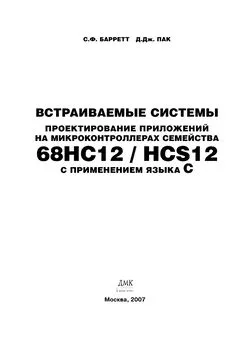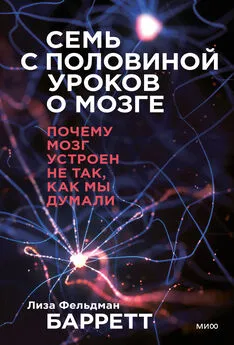Лиза Барретт - Как рождаются эмоции
- Название:Как рождаются эмоции
- Автор:
- Жанр:
- Издательство:Манн, Иванов и Фербер
- Год:2018
- Город:Москва
- ISBN:нет данных
- Рейтинг:
- Избранное:Добавить в избранное
-
Отзывы:
-
Ваша оценка:
Лиза Барретт - Как рождаются эмоции краткое содержание
Эта книга совершает революцию в понимании эмоций, разума и мозга. Вас ждет захватывающее путешествие по удивительным маршрутам, с помощью которых мозг создает вашу эмоциональную жизнь. Вы научитесь по-новому смотреть на эмоции, свои взаимоотношения с людьми и в конечном счете на самих себя. На русском языке публикуется впервые.
Как рождаются эмоции - читать онлайн бесплатно ознакомительный отрывок
Интервал:
Закладка:
Bargmann, C. I. 2012. “Beyond the Connectome: How Neuromodulators Shape Neural Circuits.” Bioessays 34 (6): 458–465.
Barrett, Deborah. 2012. Paintracking: Your Personal Guide to Living Well with Chronic Pain . New York: Prometheus Books.
Barrett, Lisa Feldman. 2006a. “Are Emotions Natural Kinds?” Perspectives on Psychological Science 1 (1): 28–58.
——— . 2006b. “Solving the Emotion Paradox: Categorization and the Experience of Emotion.” Personality and Social Psychology Review 10 (1): 20–46.
——— . 2009. “The Future of Psychology: Connecting Mind to Brain.” Perspectives on Psychological Science 4 (4): 326–339.
——— . 2011a. “Bridging Token Identity Theory and Supervenience Theory Through Psychological Construction.” Psychological Inquiry 22 (2): 115–127.
——— . 2011b. “Was Darwin Wrong about Emotional Expressions?” Current Directions in Psychological Science 20 (6): 400–406.
——— . 2012. “Emotions Are Real.” Emotion 12 (3): 413–429.
——— . 2013. “Psychological Construction: The Darwinian Approach to the Science of Emotion.” Emotion Review 5: 379–389.
Barrett, Lisa Feldman, and Moshe Bar. 2009. “See It with Feeling: Affective Predictions During Object Perception.” Philosophical Transactions of the Royal Society B: Biological Sciences 364 (1521): 1325–1334.
Barrett, Lisa Feldman, and Eliza Bliss-Moreau. 2009a. “Affect as a Psychological Primitive.” Advances in Experimental Social Psychology 41: 167–218.
——— . 2009b. “She’s Emotional. He’s Having a Bad Day: Attributional Explanations for Emotion Stereotypes.” Emotion 9 (5): 649–658.
Barrett, Lisa Feldman, James Gross, Tamlin Conner Christensen, and Michael Benvenuto. 2001. “Knowing What You’re Feeling and Knowing What To Do About It: Mapping the Relation Between Emotion Differentiation and Emotion Regulation.” Cognition and Emotion 15 (6): 713–724.
Barrett, Lisa Feldman, Kristen A. Lindquist, Eliza Bliss-Moreau, Seth Duncan, Maria Gendron, Jennifer Mize, and Lauren Brennan. 2007. “Of Mice and Men: Natural Kinds of Emotions in the Mammalian Brain? A Response to Panksepp and Izard.” Perspectives on Psychological Science 2 (3): 297–311.
Barrett, Lisa Feldman, Kristen A. Lindquist, and Maria Gendron. 2007. “Language as Context for the Perception of Emotion.” Trends in Cognitive Sciences 11 (8): 327–332.
Barrett, Lisa Feldman, Batja Mesquita, and Maria Gendron. 2011. “Context in Emotion Perception.” Current Directions in Psychological Science 20 (5): 286–290.
Barrett, Lisa Feldman, Lucy Robin, Paula R. Pietromonaco, and Kristen M. Eyssell. 1998. “Are Women the ‘More Emotional’ Sex? Evidence from Emotional Experiences in Social Context.” Cognition and Emotion 12 (4): 555–578.
Barrett, Lisa Feldman, and James A. Russell. 1999. “Structure of Current Affect: Controversies and Emerging Consensus.” Current Directions in Psychological Science 8 (1): 10–14.
——— , eds. 2015. The Psychological Construction of Emotion . New York: Guilford Press.
Barrett, Lisa Feldman, and Ajay B. Satpute. 2013. “Large-Scale Brain Networks in Affective and Social Neuroscience: Towards an Integrative Functional Architecture of the Brain.” Current Opinion in Neurobiology 23 (3): 361–372.
Barrett, Lisa Feldman, and W. Kyle Simmons. 2015. “Interoceptive Predictions in the Brain.” Nature Reviews Neuroscience 16 (7): 419–429.
Barrett, Lisa Feldman, Michele M. Tugade, and Randall W. Engle. 2004. “Individual Differences in Working Memory Capacity and Dual-Process Theories of the Mind.” Psychological Bulletin 130 (4): 553–573.
Barsalou, Lawrence W. 1985. “Ideals, Central Tendency, and Frequency of Instantiation as Determinants of Graded Structure in Categories.” Journal of Experimental Psychology: Learning, Memory, and Cognition 11 (4): 629–654.
——— . 1992. Cognitive Psychology: An Overview for Cognitive Scientists. Mawah, NJ: Lawrence Erlbaum.
——— . 1999. “Perceptual Symbol Systems.” Behavioral and Brain Sciences 22 (4): 577–609.
——— . 2003. “Situated Simulation in the Human Conceptual System.” Language and Cognitive Processes 18: 513–562.
——— . 2008a. “Cognitive and Neural Contributions to Understanding the Conceptual System.” Current Directions in Psychological Science 17 (2): 91–95.
——— . 2008b. “Grounded Cognition.” Annual Review of Psychology 59: 617–645.
——— . 2009. “Simulation, Situated Conceptualization, and Prediction.” Philosophical Transactions of the Royal Society B: Biological Sciences 364 (1521): 1281–1289.
Barsalou, Lawrence W., W. Kyle Simmons, Aron K. Barbey, and Christine D. Wilson. 2003. “Grounding Conceptual Knowledge in Modality-Specific Systems.” Trends in Cognitive Sciences 7 (2): 84–91.
Bartal, Inbal Ben-Ami, Jean Decety, and Peggy Mason. 2011. “Empathy and Pro-Social Behavior in Rats.” Science 334 (6061): 1427–1430.
Beard, Mary. 2014. Laughter in Ancient Rome: On Joking, Tickling, and Cracking Up. Berkeley: University of California Press.
Bechara, Antoine, Daniel Tranel, Hanna Damasio, Ralph Adolphs, Charles Rockland, and Antonio R. Damasio. 1995. “Double Dissociation of Conditioning and Declarative Knowledge Relative to the Amygdala and Hippocampus in Humans.” Science 269 (5227): 1115–1118.
Becker, Benjamin, Yoan Mihov, Dirk Scheele, Keith M. Kendrick, Justin S. Feinstein, Andreas Matusch, Merve Aydin, Harald Reich, Horst Urbach, and Ana-Maria Oros-Peusquens. 2012. “Fear Processing and Social Networking in the Absence of a Functional Amygdala.” Biological Psychiatry 72 (1): 70–77.
Becquet, Celine, Nick Patterson, Anne C. Stone, Molly Przeworski, and David Reich. 2007. Genetic Structure of Chimpanzee Populations. PLOS Genetics 3 (4): e66. doi:10.1371/journal.pgen.0030066.
Beggs, Simon, Gillian Currie, Michael W. Salter, Maria Fitzgerald, and Suellen M. Walker. 2012. “Priming of Adult Pain Responses by Neonatal Pain Experience: Maintenance by Central Neuroimmune Activity.” Brain 135 (2): 404–417.
Bekoff, Marc, and Jane Goodall. 2008. The Emotional Lives of Animals: A Leading Scientist Explores Animal Joy, Sorrow, and Empathy—and Why They Matter. Novato, CA: New World Library.
Benedetti, Fabrizio. 2014. “Placebo Effects: From the Neurobiological Paradigm to Translational Implications.” Neuron 84 (3): 623–637.
Benedetti, Fabrizio, Martina Amanzio, Sergio Vighetti, and Giovanni Asteggiano. 2006. “The Biochemical and Neuroendocrine Bases of the Hyperalgesic Nocebo Effect.” Journal of Neuroscience 26 (46): 12014–12022.
Berent, Iris. 2013. “The Phonological Mind.” Trends in Cognitive Sciences 17 (7): 319–327.
Bergelson, Elika, and Daniel Swingley. 2012. “At 6–9 Months, Human Infants Know the Meanings of Many Common Nouns.” Proceedings of the National Academy of Sciences 109 (9): 3253–3258.
Berlau, Daniel J., and James L. McGaugh. 2003. “Basolateral Amygdala Lesions Do Not Prevent Memory of Context-Footshock Training.” Learning and Memory 10 (6): 495–502.
Berns, Walter. 1979. For Capital Punishment: Crime and the Morality of the Death Penalty. New York: Basic Books.
“Better Than English.” 2016. http://betterthanenglish.com/.
Beukeboom, Camiel J., Dion Langeveld, and Karin Tanja-Dijkstra. 2012. “Stress-Reducing Effects of Real and Artificial Nature in a Hospital Waiting Room.” Journal of Alternative and Complementary Medicine 18 (4): 329–333.
Binder, Jeffrey R., and Rutvik H. Desai. 2011. “The Neurobiology of Semantic Memory.” Trends in Cognitive Sciences 15 (11): 527–536.
Binder, Jeffrey R., Rutvik H. Desai, William W. Graves, and Lisa L. Conant. 2009. “Where Is the Semantic System? A Critical Review and Meta-Analysis of 120 Functional Neuroimaging Studies.” Cerebral Cortex 19 (12): 2767–2796.
Binder, Jeffrey R., Julia A. Frost, Thomas A. Hammeke, P. S. F. Bellgowan, Stephen M. Rao, and Robert W. Cox. 1999. “Conceptual Processing During the Conscious Resting State: A Functional MRI Study.” Journal of Cognitive Neuroscience 11 (1): 80–93.
Birklein, Frank. 2005. “Complex Regional Pain Syndrome.” Journal of Neurology 252 (2): 131–138.
Black, Ryan C., Sarah A. Treul, Timothy R. Johnson, and Jerry Goldman. 2011. “Emotions, Oral Arguments, and Supreme Court Decision Making.” Journal of Politics 73 (2): 572–581.
Bliss-Moreau, Eliza, and David G. Amaral. Under review. “Associative Affective Learning Persists Following Early Amygdala Damage in Nonhuman Primates.”
Bliss-Moreau, Eliza, Christopher J. Machado, and David G. Amaral. 2013. “Macaque Cardiac Physiology Is Sensitive to the Valence of Passively Viewed Sensory Stimuli.” PLOS One 8 (8): e71170. doi:10.1371/journal.pone.0071170.
Blow, Charles M. 2015. “Has the N.R.A. Won?” New York Times , April 20. http://www.nytimes.com/2015/04/20/opinion/charles-blow-has-the-nra-won.html.
Blumberg, Mark S., and Greta Sokoloff. 2001. “Do Infant Rats Cry?” Psychological Review 108 (1): 83–95.
Blumberg, Mark S., Greta Sokoloff, Robert F. Kirby, and Kristen J. Kent. 2000. “Distress Vocalizations in Infant Rats: What’s All the Fuss About?” Psychological Science 11 (1): 78–81.
Boghossian, Paul. 2006. Fear of Knowledge: Against Relativism and Constructivism . Oxford: Clarendon Press.
Borsook, David. 2012. “Neurological Diseases and Pain.” Brain 135 (2): 320–344.
Bourassa-Perron, Cynthia. 2011. The Brain and Emotional Intelligence: New Insights . Florence, MA: More Than Sound.
Bourke, Joanna. 2000. An Intimate History of Killing: Face-to-Face Killing in Twentieth-Century Warfare . New York: Basic Books.
Boyd, Robert, Peter J. Richerson, and Joseph Henrich. 2011. “The Cultural Niche: Why Social Learning Is Essential for Human Adaptation.” Proceedings of the National Academy of Sciences 108 (Supplement 2): 10918–10925.
Brackett, Marc A., Susan E. Rivers, Maria R. Reyes, and Peter Salovey. 2012. “Enhancing Academic Performance and Social and Emotional Competence with the RULER Feeling Words Curriculum.” Learning and Individual Differences 22 (2): 218–224.
Bradshaw, John. 2014. Dog Sense: How the New Science of Dog Behavior Can Make You a Better Friend to Your Pet . New York: Basic Books.
Brandone, Amanda C., and Henry M. Wellman. 2009. “You Can’t Always Get What You Want: Infants Understand Failed Goal-Directed Actions.” Psychological Science 20 (1): 85–91.
Bratman, Gregory N., J. Paul Hamilton, Kevin S. Hahn, Gretchen C. Daily, and James J. Gross. 2015. “Nature Experience Reduces Rumination and Subgenual Prefrontal Cortex Activation.” Proceedings of the National Academy of Sciences 112 (28): 8567–8572.
Breiter, Hans C., Nancy L. Etcoff, Paul J. Whalen, William A. Kennedy, Scott L. Rauch, Randy L. Buckner, Monica M. Strauss, Steven E. Hyman, and Bruce R. Rosen. 1996. “Response and Habituation of the Human Amygdala During Visual Processing of Facial Expression.” Neuron 17 (5): 875–887.
Brennan, William J., Jr. 1988. “Reason, Passion, and the Progress of the Law.” Cardozo Law Review 10: 3.
Читать дальшеИнтервал:
Закладка:










